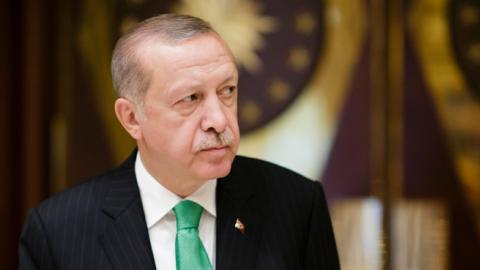A couple of weeks ago, I wrote an op-ed for The Jerusalem Post that happily announced: “On September 23, US President Donald Trump confronted the United Nations about a subject no American president has so specifically addressed before: international religious freedom.”
I applauded Trump’s concluding words to the UN: “Today, I ask all nations to join us in this urgent moral duty. We ask the governments of the world to honor the eternal right of every person to follow their conscience, live by their faith and give glory to God. The United States has a vital role in this critical mission.”
It all sounded wonderful at the time. But it looks like I applauded too soon.
What Trump said was correct: The United States certainly does have a vital role in that “urgent moral duty” of encouraging the governments of the world to honor “the eternal right of every person” to live in religious freedom.
Yet, over the past few days, Trump has manifestly failed to fulfill those aspirations. In fact, by green-lighting a Turkish invasion of north Syria, he has done precisely the opposite. He has endangered beleaguered religious minorities while cutting deals with a Turkish strongman who imprisons Kurds, Christians and thousands of innocents while stealthily supporting al-Qaeda and ISIS fighters.
On October 7, The New York Times reported, “In a major shift in United States military policy in Syria, the White House said on Sunday that President Trump had given his endorsement for a Turkish military operation that would sweep away American-backed Kurdish forces near the border in Syria.”
It was a stunning declaration. And, sadly, more than one American friend said to me, “I’m ashamed of my country today.” Why? Because Turkish President Recep Tayyip Erdogan is attacking Kurds, as well as Christians, Arabs and others, who fought valiantly alongside American forces against Islamic State. Unsurprisingly, I’m told that more than a few US soldiers – past and present – who’ve served with the Kurds are infuriated.
Then, on October 13, came the infamous phone call to the White House from Erdogan announcing that the Turkish army would imminently launch a military operation into northern Syria, and that Trump should immediately withdraw its US forces from the area. A 20-mile wide swath along the Syria-Turkey border is the centerpiece of Erdogan’s plan for what he calls a “safe zone,” meant to protect Turkey from PKK-affiliated terrorists, and to resettle millions of Syrian refugees living in Turkey.
Trump’s flash decision seems to have been made during that phone call with Erdogan, and interpretations of the conversation vary. But it seems to have boiled down to a green light for a Turkish incursion, perhaps motivated by Trump’s weariness with American’s “endless wars” and wariness about US military casualties. Whatever the case, the results have become chaotic.
Vice President Mike Pence and Secretary of State Mike Pompeo carried out a face-to-face diplomatic effort, pressing Erdogan for a temporary ceasefire, contingent on the withdrawal of Kurdish-led forces in Syria’s northeast. After a lengthy meeting, Pence announced, “The Turkish side will pause Operation Peace Spring in order to allow for the withdrawal of YPG forces from the safe zone for 120 hours.”
It didn’t take long for more than a few human rights observers to warn that a program of ethnic cleansing was about to take place. And they were right. Tens of thousands began to flee their homes. The “ceasefire” quickly failed, and reports have proliferated – supported by videos and photographs – of bloodshed at the hands of Turkish fighters, brutalizing Kurds, Christians, Yazidis and Arabs. All this, while blocking ambulances and relief efforts, and targeting others who have done nothing more than seek a safe haven.
The Times of London spoke to Bassam Gabro, an Assyrian Christian, who was standing outside his church in Syria, 8 km. from the Turkish border. He was terrified.
“‘I hope to God the Turks don’t come,’ he said, eyes filling with tears. ‘They are monsters.’”
The Times continued, “Memories of the massacres of Assyrians by Ottoman forces more than a century ago are close to the surface. The Seyfo, or Year of the Sword, came at the same time as the mass killings of Armenians in 1915. ‘These people have no mercy,’ said Gabro. ‘We remember the Seyfo. We know what they’re like. They don’t care if we’re Kurdish, Assyrian or Arab. They’ll kill everyone.’”
The frantic departure of refugees, many on foot or hitching rides with strangers, is all too reminiscent of ISIS’s 2014 assault on Iraq’s Christian towns and cities. Residents ran for their lives to escape explosions, gunfire and air assaults, not to mention widely reported rapes, beheadings and other atrocities. In fact, the Turkish aggressors’ tactics seem eerily similar to those of Islamic State.
The US Congress has condemned Turkey’s invasion, with the House passing a resolution, 354-60, opposing the president’ decision to withdraw from northeast Syria and demanding that Turkey stop the invasion. Republicans voted 2-1 in favor of the resolution.
Needless to say, following the recent betrayal the Kurds have experienced, other American allies are thinking twice about their expectations and wholehearted trust in the United States’ promises. Pompeo flew to Israel briefly after his meetings with Pence and Turkey’s leadership, reassuring Prime Minister Benjamin Netanyahu of America’s steadfastness.
Both Pompeo and Pence are self-avowed, lifelong supporters of Israel. Some have said the same about Trump. But the optics of Trump’s acquiescence to Erdogan – a self-declared enemy of Israel, and a patron of the Muslim Brotherhood with a suspicious record regarding assistance to Islamic State – send a worrisome message.
Those of us who stand with Israel, who believe in democracy, open journalism and religious freedom, have to think carefully about Trump’s green-lighting of Erdogan’s agenda. His decision actually amounts to a flashing yellow light, warning us all to proceed with caution.
Read in Jerusalem Post

















